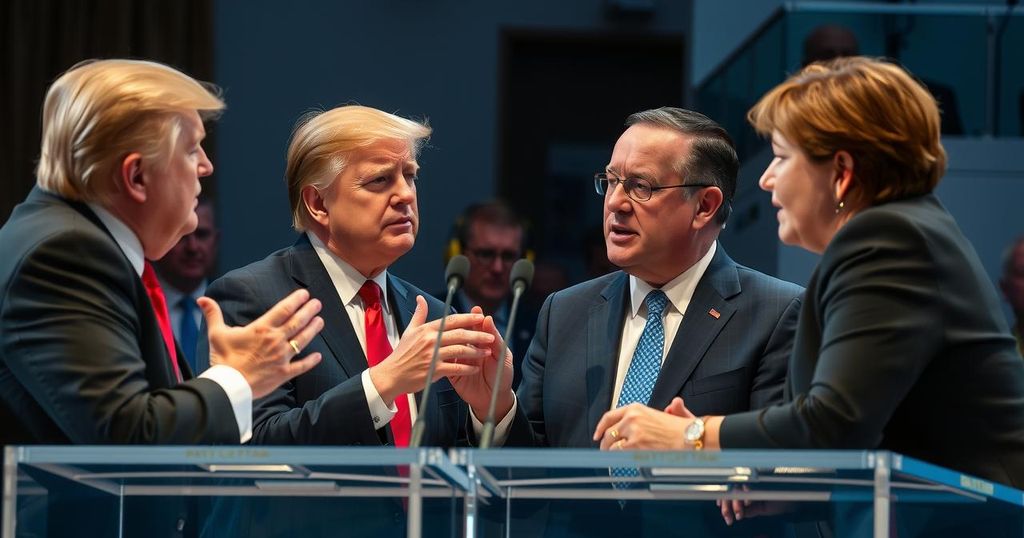World news
AFD, ASIA, BUNDESTAG, CHINA, DEFENSE SPENDING, EUROPE, EUROPE/ASIA, EUROPEAN UNION, FREE DEMOCRATS, FRIEDRICH MERZ, GERMANY, GREEN PARTY, IMMIGRATION POLICY, JO, JÖRG LAU, MEXICO, NORTH AMERICA, POLITICS, POPULISM, PUTIN, REICHSTAG, RUSSIA, SCHOLZ, UKRAINE, VOLKSWAGEN, WORLD WAR II
Michael Grant
0 Comments
Germany Faces Political Turmoil and Economic Crisis Ahead of Early Elections
In a turbulent political climate, Chancellor Olaf Scholz’s coalition faces collapse, leading to early federal elections amid economic crisis and rising extremist parties. The necessity for unity and constructive dialogue among leaders has never been more critical to restoring confidence in governance and democracy in Germany.
Recent debates in the Bundestag have devolved into personal attacks as Chancellor Olaf Scholz faces the imminent collapse of his coalition government, leading to early federal elections on February 23. Unlike typical parliamentary proceedings, this session was marked by deep-seated tensions and fierce insults among party leaders. As Scholz’s government lost a critical vote of confidence, scrutiny of the coalition’s performance heightened, alongside a significant crisis in Germany’s economy predominantly driven by soaring energy prices and poor managerial choices. The dire situation has provoked fears of substantial layoffs within Germany’s renowned automotive sector, particularly as competition from Chinese electric vehicle imports looms large.
In the midst of this crisis, the political landscape is further complicated by the rise of extremist parties on both the far-right and far-left. Parties such as the AfD and the newly formed BSW capitalize on public discontent, proposing policies that resonate with a constituency increasingly skeptical of foreign intervention and alliances. As the dynamics within Germany shift, the possibilities for coalition alliances remain uncertain. Upcoming elections, originally scheduled for September 2025, have now been accelerated, reflecting a government grappling with instability amid global pressures, notably concerning the United States under a potential Trump administration.
While the internal challenges mount, neighboring countries face their dilemmas, particularly France, which may confront a constitutional crisis that could destabilize President Emmanuel Macron’s leadership. Meanwhile, various alliances in northeastern Europe grow stronger, as nations such as Poland and the Baltic states assert leadership in European defense, countering threats posed by Russia.
The Conservative Christian Democrats, historically a dominant force in German politics, must reevaluate their strategies and connect with voters amid this crisis. Acknowledging past shortcomings and fostering cooperation among opposing parties will be crucial, as German democracy stands at a precipice during the imminent elections. The outcome will profoundly impact not just Scholz’s failed coalition, but the broader political framework and the trajectory of Germany itself.
Germany is currently navigating through a tumultuous period marked by political instability and economic decline, raising questions about its long-term viability as a leading European power. The nation faces immediate challenges stemming from internal divisions and an impending early election, prompted by the failure of Chancellor Olaf Scholz’s coalition to maintain parliamentary confidence. Economic factors compound these issues, including rising energy prices and critical competition from foreign markets. Additionally, the rise of extremist political movements poses a challenge to traditional party dynamics, complicating the path forward for governance. Given Europe’s fluctuating political landscape, particularly in light of tensions following Russia’s invasion of Ukraine, the stakes are high not only for Germany but for EU stability as a whole. As potential elections draw near, leaders must reconcile differences and present unified visions despite previous hostilities. In the upcoming two months, Germany’s electoral climate will function as a referendum on democracy and governance in a time of profound uncertainty. Stakeholders across the political spectrum are called to engage constructively, rather than succumb to partisan divisions.
In summary, Germany is experiencing a critical juncture as it faces economic decline and political fragmentation, illustrated vividly by recent debates in the Bundestag. The urgent need for stability and responsible leadership becomes imperative in the lead-up to early elections. With extremist parties gaining traction and the traditional power structures being challenged, the future direction of German politics and its role in Europe remains uncertain. As the nation prepares for pivotal elections, party leaders must prioritize dialogue over discord to safeguard the foundations of democracy and governance. Ultimately, the decisions made and alliances forged during this period will have lasting implications for Germany and beyond.
Original Source: www.theguardian.com




Post Comment